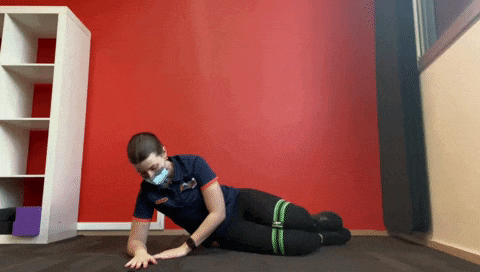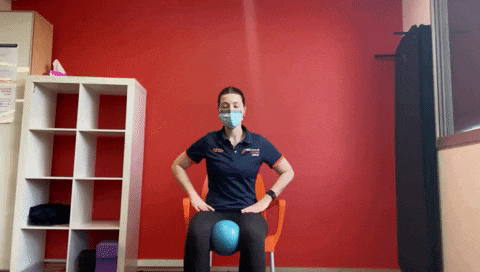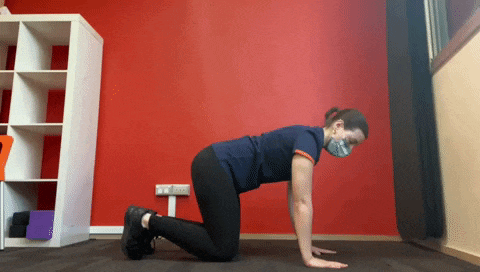Back and pelvic pain is common in pregnancy and affects around 50-80% of pregnant women. This pain is associated with the biochemical and structural changes in the body that occurs during pregnancy, after giving birth, and if breastfeeding.
These changes can alter posture and weaken muscle support.
During pregnancy the body produces the hormone relaxin, which increases during the 1st trimester and in the final weeks of pregnancy. This hormone as the name suggests, “relaxes” or loosens the muscles, tendons, and ligaments in the body to allow the body to accommodate the growing baby.
The increased weight of the belly tilts the pelvis forward causing the back to arch further to maintain balance. This “hyperlordotic” position can then cause the joints in the back to become stiff and irritated as the normal lubrication and movement is reduced.

How Is the Pelvis Affected During Pregnancy?
The joint between the pelvis (the ilium) and the spine (the sacrum) is called the sacroiliac joint (SIJ). Normally the rough, groove-like connecting surfaces of the sacrum and ilium interlock and help stabilise the joint.
However, during pregnancy the relaxin hormone loosens and widens the joints at the front and back of the pelvis (SIJ and pubic symphysis). The joint and the ligaments become loose, and the muscles which usually stabilise the pelvis can’t work as efficiently. This together with the increased load of the baby often causes pain.
The birthing process can also cause some of the ligaments in the pelvis to tear or loosen. The pain around the pelvis will typically be a dull ache but can become a sharper pain with activities like standing from a seated position, climbing stairs, and getting out of the car.

The pain usually occurs on one side but can be across both, and the pain can refer down to the buttock or back of the thigh.
What Can Be Done to Lessen the Pain?
- Avoid excessive unilateral (single leg activities) such as excessive twisting, lifting, single leg stance postures, stair climbing.
- Get up out of a chair putting equal weight through both feet
- Get out of a car by swinging both legs out first and not twisting your back
- Sleep on your side with a pillow between your legs and under your pelvis
- Ask a Physio for exercises to strengthen your core muscles. These muscles act like a corset around your lower back and pelvic region and can help support your pelvis
- Avoid lying on your back for long periods of time, particularly after 19 weeks of pregnancy. The weight of the baby and uterus can compress blood vessels and reduce the blood flow to the placenta and baby
- Keep your stomach muscles tight and bottom tucked under in to reduce the curvature in your lower back. Do not hold your breath
- Keep your knees slightly bent when standing as locking the knees can increase the amount of curvature on your lower back
- Avoid lifting or carrying heavy objects
- Reduce your stride length and take smaller steps
- Ask your Physio about a maternity belt. Wearing this around the pelvis can provide some relief as it re-stabilises your pelvis
- Start strengthening your pelvic floor muscles to prevent incontinence (leaking urine):
- try avoid going to the toilet when you first feel the first urge to go and wait to feel the urge the second time
- think of your pelvic floor muscles as a hammock and gently draw them up towards your belly and hold for 10 seconds. Perform these exercises about 10 times daily
Some Common Exercise Options
We’re cautiously putting these into this article to give you some food for thought about potentially beneficial exercises. Whilst showing these, we highly recommend first seeing a Physio to get advice specific to you – not all exercises will suit all people.



This article was written by Physiotherapist – Laura Bravo, from our Precision Physio Concord clinic. If you would like more information, or feel you might benefit from a session with one of the Precision Physio team, you can either come into our clinics, or work with us online.
How Do I Book An Appointment?
We’re taking the health of our clients, members and staff very seriously and our preference would be for you to call to book an appointment so that we can make sure to explain our approach to keeping you safe. You can call any of these numbers to schedule a session:
- Precision Physio Concord: 02 9736 3950
- Precision Physio St Marys: 02 9623 2220
Online Consultations
Evolving with the current environment, we are also now offering online appointments, meaning that we can support anyone who is unable to leave their home. Sessions are done via our state of the art Telehealth system and as long as you have a laptop or tablet with an inbuilt camera, or a phone with camera, we can help!
To learn more about online consultations, please call us on any of the numbers listed above.